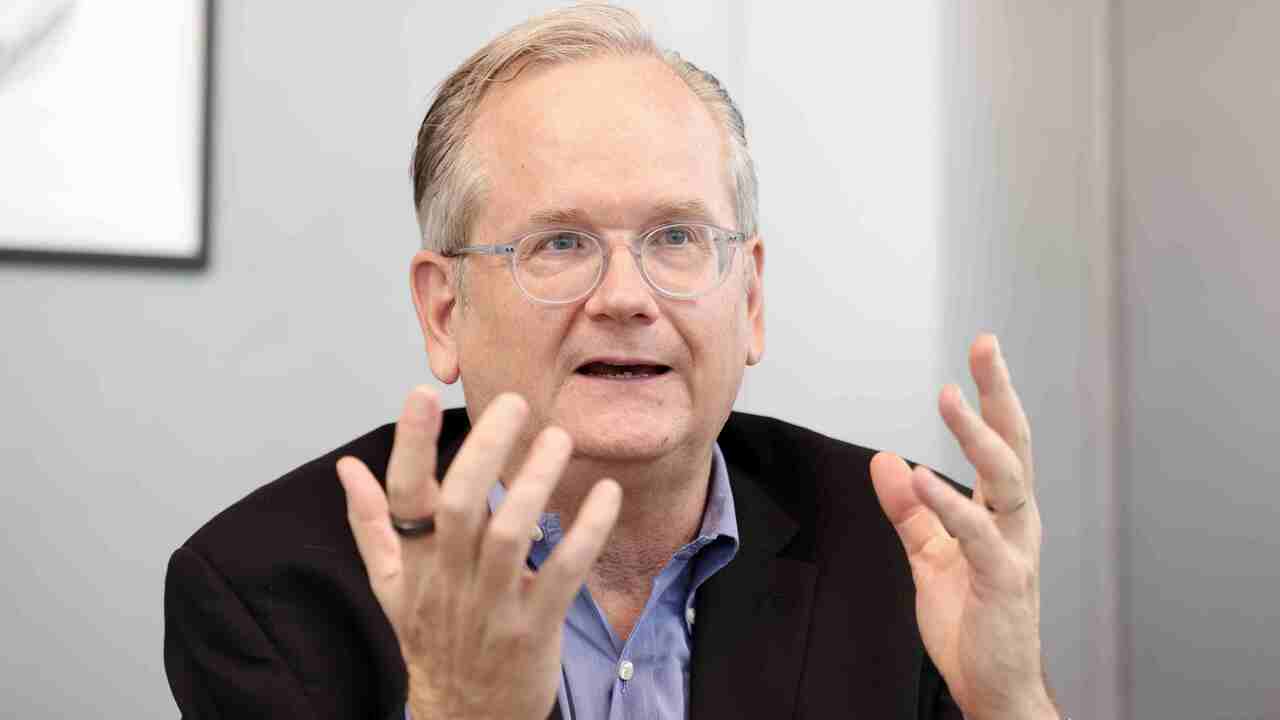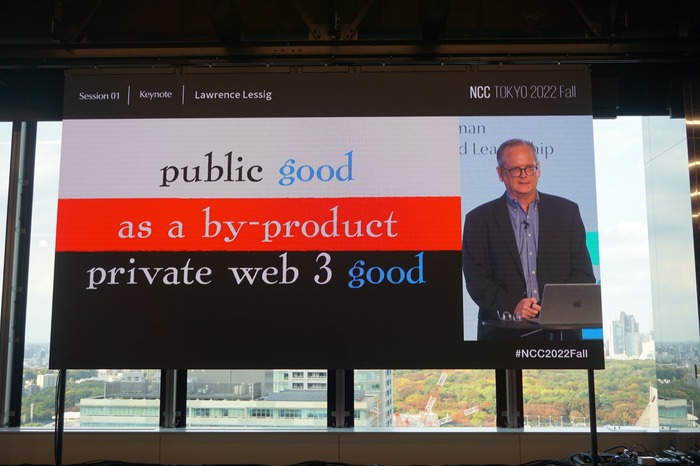
As a long-time observer of the Internet order, what does the current state of that look like, where Big-Tech is a major force? Do you think that the decentralized block chain based technology known as Web3 has the potential to change the way the Internet has been structured for a decade?
First, the existing big tech has created enormous problems for American society and I think society around the world. The single dominant business model of advertising leads to engagement-based social media, which then leverages our psychology to lead us to behave in increasingly socially destructive ways.
Politically, we've become polarized because it turns out if you give people polarizing, anger inducing content. They're more likely to engage with it and if you give them content about science or anything like that. The consequence of that is that the business model has enormous externalities for society.
Could Web3 be different? Yes, it could be different. Nobody has a clear sense of what the business models of entities within Web3 will be. But what's clear is there's a greater diversity of entities that would be participating.
To the extent Web3 can deliver on the commitment to lower the infrastructure cost of organizing and governance and contracting, I think it will be an enormous challenge to the existing tech infrastructure.
What is the timeline if web3 could change the existing internet structure?
I think we're going to see a radically different web or internet in the next 10 years. The part that people don't have a good intuition about is the role of AI in developing that infrastructure. Right now, AI is playing an enormously destructive role ― because AI is driving this engagement-based business model. It's driving it in socially destructive ways.
But there's ways that AI can be used to be pro social, and support the development of this infrastructure of Web3. I think to the extent we see AI developed to empower Web3 infrastructures to deliver better governance and better contracting, it will be a much more edifying internet than it is right now. Nobody can — nobody has any basis to — make a strong prediction. But I believe this will be its potential.
Elon Musk has no understanding of what's at stake.
We have seen the sequence of the event that Elon Musk acquired Twitter for $44 billion and he had a massive lay off in that including the department of content moderation and AI ethics etc., so what do you make of this? Can he manage the public discourse on twitter well?
It's terrifying because Elon Musk has not demonstrated the discipline that power requires. I think it's a problem with being the richest man in the world, working around rocket scientists: I'm sure he knows about rockets, and he knows about developing technology for electric cars, and his work there deserves respect. Especially Tesla, which is an amazing company. But when I hear him talk about free speech, it's embarrassing. He has no understanding of what's at stake and of the problems of Twitter.

It's hard to know exactly what's happened and what he's doing, other than the visible things like, an extraordinary number of staffers have been fired or have left. Representative Alexandria Ocasio-Cortez, AOC, recently reported that her Twitter has been affected once she began to be critical of Musk. It's a striking feature of these tech billionaires that they feel entitled to retaliate when they're criticized.
That’s true not only with Twitter but also with Amazon. It's well known that if you are critical of Amazon, as a publisher or as an author, you will be punished. When my book Republic Lost came out in 2011, it was published by Hachette, a press that got into an argument with Amazon about its strategies.
My book went from a book that was promised to be delivered within 24 hours to a book that would take six weeks to be delivered, because every one of the books from this publisher was put on a six week delivery schedule, as a way to punish the company for criticizing Amazon.
It's a terrifying idea that people who are so powerful believe they can use their power against people who are critical of them. My fear is that Elon Musk is similarly motivated. If that's true, then I fear for what's going to happen to Twitter.
The core is to regulate the business model of engagement.
Big-Tech platforms and their core technology, AI, are transforming the nature of democracy and civic life, for better or worse. Meanwhile, the EU is taking a more regulatory stance on digital technology, including the recently passed DMA (Digital Market Act) and DSA (Digital Services Act), which would be EU's online platform policy at the heart of. What do you think governments should do in other countries and regions?
A. As somebody who laments the inability of the American government to do anything, I admire the fact that the Europeans are able to do something. But I fear that what they do often misses the point.
The way most people experience this point today is the way that every time they go to a web page, a little cookie box pops up and asks them to consent to cookies according to GDPR (General Data Protection Regulation), created by the EU: As if that does anything helping anybody's privacy or as if anybody has the capacity to even understand what's being told to them! Yet we are forced to go through this Kabuki Theater of pretending that there's something significant here when we all realize there's nothing significant there as well.
I fear the DMA and the DSA are similarly well intentioned, but similarly miss the point. The fundamental problem with the internet right now is the business model of engagement. When these regulations got close to regulating that business model — in the context of advertising to children — they held back. They didn't, they weren't even willing to regulate the business model in that critical place. That is a weakness.
There are things we could do. For example, we could have an engagement tax in which the regulator levies an increasing tax at a certain point based on engagement level with customers. Something like that could address the core problems.
Let’s take a look at the U.S. case. Joe Biden appointed Lina Kahn as a chair person of FTC (Federal Trade Commission) in June 2021 and as a youngest person ever. Do you think she is doing a good enough job?
She's doing a great job in an agency that is not as powerful as it needs to be. The FTC is a very old agency, built in a very different time, and they're constrained in what they can do. But I have enormous admiration for what she is doing.
I don't think that's enough. I think there needs to be a more effective internet regulator. There are so many serious threats that the internet produces inside of society that we desperately need an effective way to address. Social media is just one.
But the security threats causing the loss of people's income or wealth because hackers find ways to break into their accounts — that is also a critical threat. These are all problems regulation could address, but we have an insufficient capacity within government to address these problems now. The FTC is doing as much as they can, given their limited jurisdiction. I think we need much more.
We should change the media infrastructure
Let me ask about midterm election, which will be held in November. In terms of the state of democracy, how the U.S. society would be changed or not? (Note: this interview was held just before midterm election).
It looks very scary. Because I don't think the Democrats have put together a story that is convincing America that it needs to show up and defend democracy. Then there will continue to be efforts to weaken democracy in America.
The extremes to which those efforts have gone so far is really historically unprecedented. The MAGA (Make America Great Again) Republicans, the Trump supporters, recognize that they can't win the old fashioned way, which is just to get more votes than the other side. They therefore have to suppress participation, which means the vote of the party on the other side as much as they can.
They're even talking about empowering state legislatures to reverse the vote of the people in their states so that they can make sure that they can elect a president even when they have not received as many votes.
There's no sufficiently powerful force resisting this. The Supreme Court has basically signaled that it's not interested in stopping this anti-democratic trend. And we don't have a Democratic party that's done enough to resist it. I think many of us are very frightened about where we will be. In 2024, it's going to be a very frightening time for democracy in America.
Some people say the United States is stepping into a state like the Civil War. How can they restore the state of democracy and make that better by technology?
One startling fact describes the nature of the problem: There are as many people today who believe that the election was stolen in 2020 as there were on January 6 — even though we are more than two and a half years after that event, with two and a half years of ample information demonstrating there was no theft of that election.
Yet that information has had no effect on the views of a certain segment of the American public. That's because we have a media infrastructure that is focused on giving people what they want to hear, rather than giving people the truth. They allow people to live in a fantasy world, with conspiracies and ideas that drive them to crazy behavior.
The real question is how we get back from this. I'm not sure that — without changing the media infrastructure — we have a way back from this. In some sense, there's no optimistic story about how we restore democracy until we figure out how we break up the character of this media.
If there were some way to hold on for now, I do think the Democrats have a platform for reform that at least begins to address problems American democracy has, and that might convince more Americans to be supportive of change.
If you were to get people age, you know, 18 to 29, to vote in the same proportion as people who are 65 or older, it would produce a radically different political outcome. The Democrats would sweep if the young people would vote.
We know that people at that age are strongly opposed to the MAGA Republicans, because of the abortion ruling and the resistance to any kind of progress on social issues. But the challenge is that they just don't show up to vote. They feel entitled not to show up to vote. If they will not vote, the people who do vote will prevail. The consequence, I believe, will be very disruptive to democracy.
